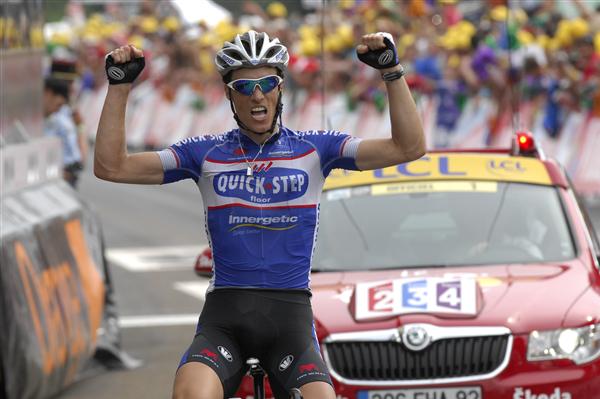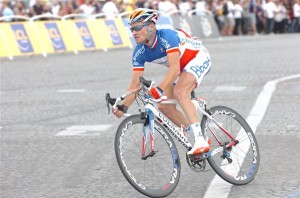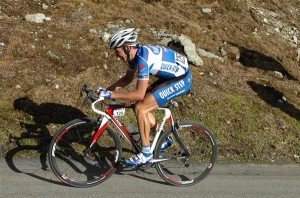Last week, we started to take a look at riders who might perform well under the UCI’s radio ban in races ranked 1.HC/2.HC or below. We started with three tacticians who have built reputations for racing intelligently – Phillipe Gilbert, Andreas Klier, and Fabian Cancellara.
However, we don’t think that the radio ban will only favor those riders who can sense fatigue, despair, or that elusive odor of being behind the eight ball in the riders around them. While it’s hard to predict the exact effects of the radio ban, we can’t help but wonder if the lack of communication to the team car might cause chasing teams to misjudge what it will take to pull back a day-long breakaway.
And so, the next class of riders who may excel under the ban are breakaway artists, those who prefer to spend long days under the sun or in the rain surrounded by a small handful of others, racking up television time for their sponsors on the gamble that they’ll reach the finish line before the peloton.
The French…
As Ted King said, so many races begin with “the French trying to out-French each other.” No two riders represent the French penchant for a breakaway like Thomas Voeckler and Sylvain Chavanel. Pick a race of any length or profile, guess that one of these two will attempt a breakaway, and you’ll more often be correct than not. In the last couple of years, both have seen an increasing amount of success – are they both maturing, and becoming better tacticians? Stronger?
Voeckler presented a perfect example of his style in 2011’s Paris-Nice, convincingly winning two stages. His first stage came after a group of 4 spent 185 kilometers away from the peloton. With the peloton a mere 15 seconds behind them at the line, Voeckler was able to hold off his companions to the take win. His second win came in the 8th stage, where he soloed away from another long, albeit this time fragmenting, breakaway. Resplendent in his national champions jersey, he impressed many with his strength both on the bike and off, having stayed with his team despite its near collapse as Bbox and last minute rescue by Europcar.
For the last few years, Chavanel has been a threat in every race he’s entered. If there’s an early break, he’s there, and when successful, often powers away from his companions to solo in for a win. Doing so allowed his win in stage 2 of last years Tour de France – had he been with the peloton, he likely would have been a victim of the crashes descending Côte d’Aisomont that caused the neutralization of the stage or everyone but Chavanel, who got to wear the yellow jersey for a day. Stage 7 of the same race saw the ultimate in pluck, when he pulled an almost identical move, slipping away in a small break and dropping his companions, winning the stage and unexpectedly taking the yellow jersey back for another day.
While occasionally successful, the breaks Voeckler and Chavanel situated themselves in are often labeled suicide breakaways. While we wax poetic about their success, they more often result in failure in the final kilometers of the race, where the calculations of the peloton and their support teams set them at the exact pace required to intercept the break at the end, while expending a minimum amount of energy. Remove the real-time feedback via a radio headset, requiring the riders to either calculate themselves or drop back to their team cars to understand what sort of pace they’re going to need to set, and you can bet more of these breaks will succeed, with the peloton just missing in their timing. The survival odds just got a little bit better.
…and a Belgian
Stijn Devolder has spent much of the early part of this season looking a bit lost and confused, on the wrong side of the peloton. Was he dazzled by the bright yellow reflection coming off of his gloves? Was he burdened by the difficulty of making a necessary bike change without radios, as was reportedly the case in Omloop? Or is he just not fit yet? Who knows. The two-time Ronde van Vlaanderen winner, four-time Belgian Champ (twice in the road race, twice in the time trial) races like a mad dog when he’s off the leash. In his Questions For The Classics, Whit wonders if Devolder’s successes in 2008 and 2009 – most notably his two victories in the Ronde – were due to having a heavily-marked Tom Boonen as a teammate. Even if that’s the case, a peloton sans-radios might exhibit behavior that mimics one marking a superstar – a moment of hesitation, a bit of confusion – and suddenly, Stijn Devolder might have that open road before him that he loves so much. There are plenty of questions surrounding his career, his lackluster 2010 season, and whether he’ll be happy at his new home with Vacansoleil-DCM; among them is whether or not he’ll find additional race moments to deploy his devastating attacks.




Paris-Nice had radios didn't it?
Yes, there were race radios in Paris-Nice, but his performance there was presented as an example of his racing style, a style which may be successful without radios, not as an example of success without radios.
Sure did – all World Tour events allow radios this year. We're just talking about riders we think will benefit from a radio ban – we won't see its impact in WT and HC races until next year, if the UCI continues on its current path. Still, there's a lot of racing outside of those two calendars, and we think it'll change the game for certain classes of riders in those events.